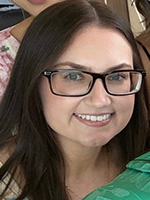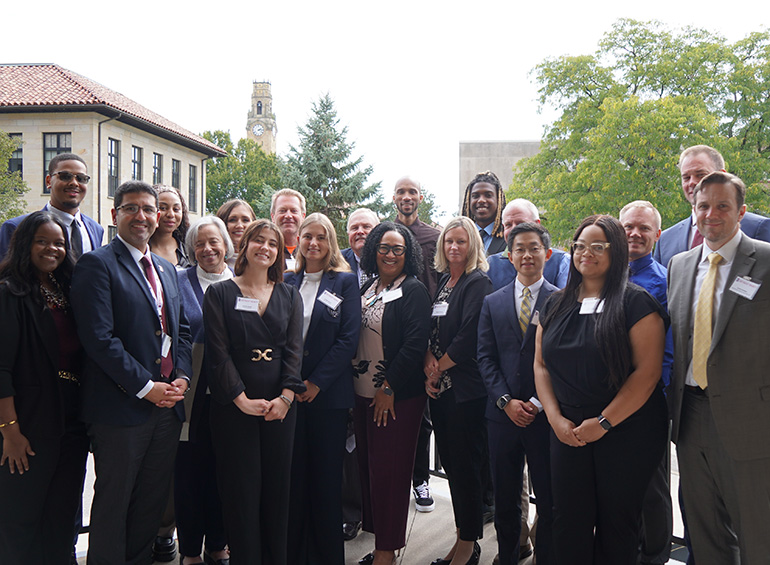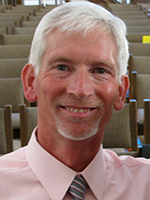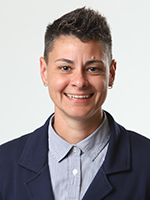Graduate HSA Programs

The Health Services Administration (HSA) graduate programs are designed to educate students to become innovative leaders in today's dynamic healthcare organizations.
Get your Master's Degree
The Master of Health Services Administration (MHSA) program builds on its strong connection with the healthcare industry and the community, bringing health-related work experience into the classroom; and develops competencies in:
- management
- research techniques
- fiscal management
The 42-credit master's degree can be completed in five semesters. See Admission and Application Requirements below.
You might also consider getting your MBA simultaneously with The MBA/MHSA dual degree. This accommodates healthcare professionals who wish to establish themselves as partners with the business staff in the healthcare environment, as well as business professionals currently in or moving into the healthcare environment.
Healthcare Operations Management (HOM)/Master of Health Services Administration (MHSA) Information Sessions
Upcoming dates are below. Faculty and students will be available to provide information and take your questions.
Sessions begin at 6 p.m. local time in Detroit (EST or EDT).
Tuesday, February 24
Tuesday, March 31
Tuesday, April 14
Tuesday, May 26
Tuesday, June 23
![]()
Online and Hybrid Classes
The graduate degree in Health Services Administration is offered in a variety of formats that include classes online and hybrid to meet the needs of students living and working in the metropolitan area.
Students can start any semester and progress full-time or part-time.
Not all classes and times are offered every semester in every format. Talk with an advisor to create a plan that will work for your schedule.
![]()
In the Classroom
You'll be joining a diverse student body and learning from highly qualified faculty who focus on active learning and case-based instruction. And you'll benefit from small class sizes and real-world experience. All faculty are currently practicing or former healthcare administrators; all full-time faculty have doctoral degrees in their field of expertise.
![]()
Career networking as a student
MHSA students are eligible to attend the educational programs sponsored by MCACHE. Attending these programs provides students with opportunities to meet many healthcare executives and learn about relevant health topics.
Each year students are invited to participate in a job shadow event. This innovative event provides an opportunity for students to spend a day with a healthcare executive, observe the executive’s activities and meet other executives within the organization.
86%
Job Placement for 2023-25
100%
Retention Rate in the MHSA program in 2024-25
23%
Projected Job Growth by 2034, 7x faster than averagePost-Baccalaureate Certificate Programs
Health Services Administration Certificate
The Health Services Administration graduate certificate prepares non-business health care professionals in the business aspects of healthcare. More information: Post-Baccalaureate Certificate in Health Services Administration program (other than business students).
Health Services Administration Management Certificate
Students may also be interested in the Post-Baccalaureate Certificate in Health Services Administration Management for business students.
How do our alumni feel about UDM?

"University of Detroit Mercy’s values have not only been present in my professional career but also in my personal life. I’ve always wanted to take part in improving access to healthcare & the university has definitely provided me with the framework to do so."
— Emily Piatkowski '20, MHSA
Revenue Cycle Project Manager, McLaren Health Care

During Rhea Rodgers' postgraduate studies at University of Detroit Mercy, she had the unique privilege of immersing herself in a transformative educational experience. Her journey was marked by meaningful connections with outstanding professors, mentors, preceptors and peers who enriched her academic and professional growth.
— Rhea Rodgers '21, MHSA
Physician Engagement Specialist Optum

Inspired to positively impact healthcare delivery, Ayah Koujane pursued a master’s in health services administration (MHSA). She selected University of Detroit Mercy’s MHSA program for several reasons, including the flexible class formats, expert faculty and successful job placement rate.
— Ayah Koujane '24, MHSA
Administrative Fellow, Corewell Health

"Scholarships played a crucial role in my journey, enabling me to focus on my studies, attend conferences such as the ACHE Congress and pursue my passion for positively impacting healthcare without the burden of financial stress. The support I received reinforced my commitment to giving back and serving the underserved communities."
— Daniel Orhorhoro '23, MHSA
Hospital Operations Specialist, Corewell Health, Royal Oak
What do our students say?

While attending Detroit Mercy, Xavier has joined multiple organizations/societies including: the Midwest Chapter of the American College of Healthcare Executives (MCACHE), the National Society of Leadership & Success, and Phi Beta Sigma Fraternity Inc. Having the opportunity to be provided with an internship has allowed Xavier to grow professionally and get a better understanding of what he wants to do in the future.
— Xavier Martin, Current Student

Barbera chose Detroit Mercy for its small class sizes, proximity to home and family connection—her mother graduated from UDM’s Dental Hygiene program in 1998. A dedicated mother, Barbera wanted to show her children that it's never too late to follow your dreams.
—Candace Barbera

University of Detroit Mercy hosted the MCACHE case competition. Pictured here are the participants, judges and program directors from the Midwest region universities. MHSA students are eligible to attend many such educational programs sponsored by MCACHE.
-
MHSA Application and Admission
Graduate Application Requirements
- A baccalaureate or advanced degree from a regionally-accredited college or university, with a cumulative grade point average (GPA) of 3.0 or better (on a 4.0 scale). Your undergraduate degree does not have to be healthcare-related.
- Resume or Curriculum Vita.
- Work experience, in health care and otherwise, is very helpful in this program but not required.
- Two professional letters of recommendation. Letters should be attached to the recommendation form sent from the University. If you have questions, please contact Donna Gormely at gormeldm@udmercy.edu or (586) 263-6232
- Official transcripts sent directly from all colleges and universities attended.
- A brief (1-2 pages) essay explaining why you are interested in pursuing the MHSA Program at the University of Detroit Mercy (see "Essay" below).
- For international students: Duolingo score of 120, TOEFL at 86 or IELTS at 6.5
- A personal interview with the Health Services Administration Program Director may be requested.
Essay
Your admissions essay should include:
- how your prior professional and/or personal experience led to your choice of a career in health administration
why the MHSA program at the University of Detroit Mercy is of particular interest to you (including how you see your professional and/or personal goals relating to the mission of the MHSA Program) - what your professional goals are upon graduation from the program / how you plan to use the MHSA degree upon graduation
- For international students: why you chose the U.S. as your study destination
MHSA Program has zero tolerance for plagiarism in all application documents and academic work. Please see references below to assure that all of your application documents meet the University of Detroit standards for admission.
References:
ApplyBoard.com (2021). Preventing Plagiarism in Your Statement of Purpose or Admissions Essay.
U.S. Homeland Security (2016). Students: avoid plagiarism on your college application.
Probationary Admission
Students who do not meet the admission requirements, but who show other indicators of potential success will be considered for probationary admission. If admitted on probation, the student will be required to pass the first three HSA courses with a grade of B or better in each of the courses. These courses may not be repeated.
Application Deadlines
Please note: Official application deadlines for each semester are- Fall Semester: August 1
- Winter Semester: Nov. 1
- Summer Semester: April 1
Applying after the deadline
It is always best to submit a completed application by the deadline in order to ensure that there is sufficient time for the MHSA Program and Admissions Office to review and process it. Although it is possible to submit a late application after the official application deadline has passed, it would be reviewed and processed only if time permits. Your chances depend on the number of students who applied on time and accepted their spot after the admission selection round.
There are two ways to apply:
Option 1 is directly through Detroit Mercy, the online application is free - click here to apply. Admissions Office, 4001 W. McNichols Rd., Detroit, MI 48221. If you have any questions, please call 1-800-635-5020.
Option 2 is through the Healthcare Administration, Management & Policy Centralized Application System (HAMPCAS).
Our graduate program in Health Services Administration is a participant of HAMPCAS. This means that applicants can now apply to health management, administration and policy programs across different colleges and universities throughout the U.S. by way of a single, web-based application. See below for the benefits to applicants when using HAMPCAS.
Go to HAMPCAS to apply now.International Students
In lieu of sending foreign transcripts directly to us, applicants who have studied overseas must submit official foreign transcripts to an approved (WES and ECE) foreign transcript evaluation service for a course-by-course U.S. equivalency report. Contact the foreign transcript evaluation service as early as possible. The service may take several weeks to process your foreign transcript once it is received.
Applicants who are not United States citizens must contact the International Admissions Office for information about the application process and status. For more information click here. You may also contact them at:
International Admissions Office
Phone: 313-993-3310Fax: 313-993-3326
admissions@udmercy.edu -
Healthcare Administration, Management & Policy Centralized Application Service (HAMPCAS)
About HAMPCAS
The Healthcare Administration, Management & Policy Centralized Application Service (HAMPCAS) is the first national centralized application service designed for students applying to graduate programs in health administration, healthcare management and health policy. The service enables applicants to apply to multiple colleges and schools through a single web-based application.
To provide applicants with the most efficient application process, we are pleased to announce that University of Detroit Mercy’s Master of Health Services Administration (MHSA) degree program is a participant in the Healthcare Administration, Management & Policy Centralized Application System (HAMPCAS). Applicants can either apply directly to University of Detroit Mercy or through HAMPCAS.
By using the HAMPCAS portal, applicants apply to health management, administration and policy programs across a variety of colleges and universities throughout the U.S. by way of a single, web-based application.
The benefits to applicants using HAMPCAS are many, including:
- Decreases the time and cost of applying to multiple programs.
- Eliminates duplication of effort that required applicants to submit multiple copies of credentials, transcripts, essays and more.
- Allows for the customization of essays or the use of a standard essay. For each school applying to you can select which option you prefer within one online application.
- Allows completing your application over multiple sittings before submitting to all schools simultaneously. Also allows updating your application with new information after the application has already been initiated.
- Enables you to check application status within the system from anywhere you have Internet access.
- Enables one-time payment for all applications via secure e-commerce.
HAMPCAS Application Processing Fees
Application processing fees are dependent on the number of designated programs/degrees selected by the applicant. The first designation is $115 with each additional application being $40.
Tips for a Successful HAMPCAS Application
- Apply as early as possible
- Read all of the instructions within each section of your HAMPCAS application before submitting your completed application
- Review the specifics of the programs to which you are applying via the program links within the HAMPCAS application
- Print a copy of your HAMPCAS application for your records
- Make sure to monitor your application online and check for email messages from HAMPCAS or the schools via the online application and email account you provided in your application.
Remember that your application is not considered complete and will not be processed, until you have e-submitted the application, paid your application fee and an official transcript from every college and university you have attended is received by HAMPCAS.
Questions?
Need assistance with the HAMPCAS portal? Call 617-612-2882 or email hampcasinfo@hampcas.org. HAMPCAS Customer Support is available to answer your questions Monday through Friday from 9 a.m. to 5 p.m. Eastern Time.
More Help from HAMPCAS
Have more questions about HAMPCAS? Contact AUPHA at 703-894-0940.
AUPHA mailing address is 2000 14th Street North, Suite 780, Arlington, VA 22201 www.aupha.org.
The HAMPCAS mailing address for the purpose of sending your transcripts is: HAMPCAS Transcript Processing Dept., PO Box 9122, Watertown MA 02472.
Additional Resources
FIND A PROGRAM
To search for a program, both HAMPCAS programs and non-HAMPCAS programs, go to the AUPHA website to search via lists or via the AUPHA Online Directory of Programs at http://network.aupha.org/main/resourcecenter/futurestudents/.APPLY TO HAMPCAS PROGRAMS
To find out whether the programs you want to apply are available via the HAMPCAS portal, visit http://www.aupha.org/HAMPCASSchools on the AUPHA website or go directly to HAMPCAS. -
Curriculum
MHSA Sample 2-year Plan of Study - Courses (McNichols Campus)
This is a sample sequence of course offerings for students enrolled in Fall 2021 or later. Classes may not be offered in this exact order. Please consult your advisor prior to registration. *
Term I Fall
HSA 5001 - Theory and Practice of Health Services Management (co-req HSA 5005) (2 cr)
HSA 5005 - Career Management for Health Services Administrators (co-req HSA 5001) (1 credit)
HSA 5010 - Accounting Principles in the Health Care Profession (3 credits)
HSA 5500 - Information Systems for Health Services Administration (3 credits)Term II Winter
HSA 5020 - Financial Management of Health Services (pre-req HSA 5010) (3 credits)
HSA 5825 - Professional Development for Health Services Administrators (1 credit)
HSA 5055 - Legal and Ethical Aspects of Health Services Administration (3 credits)
HLH 5700 - Health Care Delivery and Policy Issues (also offered in summer) (3 credits)Term III Summer
HSA 5070 - Population Health (3 credits)
HSA 5090 - Human Resources in Health Care Organizations (co-req ** HSA 5150) (1.5 credits)
HSA 5150 - Leadership in Health Care Organizations (co-req ** HSA 5090) (1.5 credits)Term IV Fall
HSA 5060 - Health Economics (3 credits)
HSA 5160 - Marketing for Healthcare Organizations (co-req ** HSA 5190) (1.5 credits)
HSA 5190 - Strategic Planning for Healthcare Organizations (co-req ** HSA 5160) (1.5 credits)
HSA 5400 - Healthcare Research Methods and Statistics (3 credits)
Term V Winter
HSA 5350 - Foundations of Physician Practice Management (3 credits, elective)
HSA 5780 - Quality Improvement in Health Care Organizations (3 credits)
HSA 5860 - ***Internship in Health Services Administration (offered every term) (2 credits)
HSA 5940 - ***Health Services Administration Capstone (3 credits)
* See course catalog for additional information
** Courses that are corequisites must be added to the registration basket at the same time.
*** Students must have completed at least 35 credits in the MHSA program before enrolling in the internship and capstone courses.
Related Links
-
Mission, Vision and Values
Mission
In the Mercy and Jesuit traditions, the mission of University of Detroit Mercy’s Master of Health Services Administration (MHSA) program is to educate early careerists and those looking to advance their careers to become competent and compassionate leaders to serve in diverse health care settings. The program equips graduates with a comprehensive and practical set of core competencies and is guided by a commitment to academic excellence, the dignity of all people and to provide student-centered graduate education in an urban context. The program is committed to providing students with a variety of experiential learning opportunities that align with faculty research and classroom theory.
Vision
Consistent with the visions of University of Detroit Mercy and the College of Health Professions, the Master of Health Services Administration Program will be recognized as a center of academic excellence, distinguished by community partnerships and graduates, who as health care administrators, lead, serve and promote health and social justice.
Values
The MHSA program, in the Jesuit and Mercy traditions, values the following:
- Passion for Excellence
- Student Focused Education
- Integrity and Ethics
- Evidence-based Decision-Making
- Professional role and leadership development
- Social Justice and responsiveness to the Healthcare Industry and the Community
-
MHSA Degree Competencies
MHSA PROGRAM DOMAINS AND COMPETENCIES
DOMAIN 1: LEADERSHIP
- Generate a shared vision and manage change that aligns with the organization’s strategic performance
- Manage continuous organizational learning, improvement, and growth that support governance and stakeholders.
- Foster appropriate organizational climate and culture that inspire individual and organizational excellence, encourage teamwork and valuing diversity and inclusion
DOMAIN 2: COMMUNICATIONS AND INTERPERSONAL EFFECTIVENESS
- Communicate clearly and concisely; provide and receive constructive feedback in multiple settings
- Facilitate constructive interactions with individuals and groups.
- Summarize analytical results to stakeholders.
DOMAIN 3: PROFESSIONALISM AND ETHICS
- Align personal and organizational conduct with ethical and professional standards.
- Practice ongoing self- assessment to stay current with knowledge in the field
- Demonstrate responsibility to the community by actively engaging in community service utilizing Jesuit and Mercy values to improve the health of populations
DOMAIN 4: KNOWLEDGE OF THE HEALTHCARE ENVIRONMENT
- Understand the different types of organizations in which healthcare managers and providers function
- Integrate evidence-based-practice process into the administrative decision making.
- Seek and identify opportunities to optimize the performance of local and global healthcare organizations through the application of fundamental concepts of economics
- Promote the practice of patient and family centered care.
DOMAIN 5: BUSINESS SKILLS AND KNOWLEDGE.
- Incorporate outcome measurement theory into financial and operational decision making
- Utilize information technology systems to improve organizational efficiency.
- Critically evaluate and improve the organizational structure to accomplish strategic priorities.
- Demonstrate knowledge of concepts of risk management.
- Incorporate systems theories of quality improvement to optimize organizational performance and promote patient satisfaction and safety
-
Teaching and Learning Methods
The teaching and learning methods (TLMs) used throughout the course of study are aligned with the curriculum design and emphasize methods that involve active student participation and real-world experiences. The range of these higher-level TLMs used in our courses includes In class Presentations, Case Studies, Team Activities, Simulations, External Field Experiences, Strategic/Consulting Projects, Reflective Learning, and more. These higher-level TLMs tend to be more effective in developing student competencies.
-
Assessment Methods
Assessment methods used throughout the course of study are aligned with the curriculum design and emphasize methods that involve active student participation and real-world experiences. The range of higher-level assessment methods used in our courses includes Analytical projects / papers (with grading rubrics and feedback), Case reviews (with feedback), Team Effectiveness Assessments, Strategic/Consulting Projects, Experiential Reports/Portfolios, Journaling/Discussion Board assignments, active class participation, Synthesis & Analysis Based Exams/tests. For more information, please see MHSA Program Competencies.
-
Accreditation
 The University of Detroit Mercy Master of Health Services Administration program is accredited by the Commission on Accreditation of Healthcare Management Education (CAHME).
The University of Detroit Mercy Master of Health Services Administration program is accredited by the Commission on Accreditation of Healthcare Management Education (CAHME).University of Detroit Mercy is accredited by the Higher Learning Commission (HLC) – and includes the programs within the University.
The MHSA program is a member of the Association of University Programs in Health Administration and the Higher Education Network which is through the American College of Healthcare Executives (ACHE). Members of the HSA faculty serve on the Executive Board of the local chapter of ACHE, the Midwest Chapter of the American College of Healthcare Executives (MCACHE) and participate on the chapter committees.
Health Services Administration Faculty

Thomas V. Fockler
Associate Professor
313-993-2483
fockletv@udmercy.edu

Zigmond Kozicki
Associate Professor
989-450-1451
kozickza@udmercy.edu

Mary Mitsch
Professor
*
Acting Chair of Health Services Administration
313-993-1989
mitschme@udmercy.edu

Phillip Olla
Associate Professor
Director, Center for Augmenting Intelligence
313-993-1565
ollaph@udmercy.edu

Traci Stewart
Associate Professor
313-993-1644
stewartr1@udmercy.edu
